Thesaurus : Doctrine

► Full Reference: L. Rapp, "Compliance, Chaines de valeur et Économie servicielle", ", in M.-A. Frison-Roche (dir.), L'obligation de Compliance, Journal of Regulation & Compliance (JoRC) and Dalloz, coll. "Régulations & Compliance", 2024, forthcoming
____
📕read the general contribution of the book, L'Obligation de Compliance, in which this contribution is published
____
► English summary of this contribution (done par its author) : Based on an analysis of the value chains of companies in the space sector and their recent evolution, this contribution examine the role, place and current transformations of compliance policies and strategies in the context of an industrial transformation that has become essential: the transition from an industrial economy to a service economy.
_____
🦉This article is available in full text to those registered for Professor Marie-Anne Frison-Roche's courses
________
Thesaurus : Doctrine

► Full Reference: Auteur, "Titre", in M.-A. Frison-Roche (ed.), Compliance Obligation, Journal of Regulation & Compliance (JoRC) and Bruylant, "Compliance & Regulation" Serie, to be published
____
📘read a general presentation of the book, Compliance Obligation, in which this article is published
____
► Summary of the article (done by the Journal of Regulation & Compliance - JoRC): The author takes up the hypothesis of a Compliance Law defined by its Monumental Goals, the realisation of which is entrusted to "crucial operators" and confronts it with Tax Law. The link is particularly effective since these operators possess what governments need in this area: relevant Information.
Going further, Compliance Law can give rise to two types of obligations on the part of these operators, either towards others operators who need to be monitored, corrected or denounced, or towards themselves, when they need to make amends.
In the first part of this contribution, the author shows that Compliance Obligation reproduces the mechanism of a Tax Law which, for large companies, is embroiled in a process of increasing Globalisation. It enables Governments to aspire to the "Monumental Goals" of combating tax optimisation and impoverishing governments, victims of the erosion of the tax base, in the face of the strategies of companies that are more powerful than they are themselves, by using this very power of firms to turn it against them. Companies become the willing or de facto allies of governments, particularly when it comes to recovering tax debts, or assist them in their stated ambition to achieve social justice. In this way, the State "manages" Tax Law by cooperating with companies.
In the second part, the author outlines the contours of this business Compliance Obligation, which is no longer simply a matter of paying tax. Beyond this financial obligation, it is more a question of mastering Information, particularly when multinational companies are subject to specific tax reporting obligations and are required to reveal their tax strategy, presumed to be transparent and coherent within the group : this legal presumption gives rise to obligations to seek information and ensure coherence, since a single tax strategy is not self-evident in a group.
The author emphasises that companies have accepted the principles governing these new compliance obligations and are tending to transform these obligations, particularly Transparency, into a communication strategy, in line with the ESG criteria that have been developed and a desire for fruitful relations with stakeholders. Therefore the tax relations developed by major companies are being extended not only to the tax authorities, but also to NGOs, by incorporating a strong ethical dimension. This is leading to new strategies, particularly in the area of Vigilance.
The author concludes: "A n’en pas douter, l’obligation de compliance existe bel et bien en matière fiscale." ("There is no doubt that the Compliance Obligation does exist in tax matters").
____
🦉This article is available in full text to those registered for Professor Marie-Anne Frison-Roche's courses
________
Thesaurus : Doctrine

► Full Reference: D. Gutmann, "Droit fiscal et obligation de compliance" (Tax Law and Compliance Obligation), in M.-A. Frison-Roche (dir.), L'Obligation de Compliance, Journal of Regulation & Compliance (JoRC) and Dalloz, coll. "Régulations & Compliance", 2024, to be published
____
► English summary of this contribution (done by the Journal of Regulation & Compliance): The author takes up the hypothesis of a Compliance Law defined by its Monumental Goals, the realisation of which is entrusted to "crucial operators" and confronts it with Tax Law. The link is particularly effective since these operators possess what governments need in this area: relevant Information.
Going further, Compliance Law can give rise to two types of obligations on the part of these operators, either towards others operators who need to be monitored, corrected or denounced, or towards themselves, when they need to make amends.
In the first part of this contribution, the author shows that Compliance Obligation reproduces the mechanism of a Tax Law which, for large companies, is embroiled in a process of increasing Globalisation. It enables Governments to aspire to the "Monumental Goals" of combating tax optimisation and impoverishing governments, victims of the erosion of the tax base, in the face of the strategies of companies that are more powerful than they are themselves, by using this very power of firms to turn it against them. Companies become the willing or de facto allies of governments, particularly when it comes to recovering tax debts, or assist them in their stated ambition to achieve social justice. In this way, the State "manages" Tax Law by cooperating with companies.
In the second part, the author outlines the contours of this business Compliance Obligation, which is no longer simply a matter of paying tax. Beyond this financial obligation, it is more a question of mastering Information, particularly when multinational companies are subject to specific tax reporting obligations and are required to reveal their tax strategy, presumed to be transparent and coherent within the group : this legal presumption gives rise to obligations to seek information and ensure coherence, since a single tax strategy is not self-evident in a group.
The author emphasises that companies have accepted the principles governing these new compliance obligations and are tending to transform these obligations, particularly Transparency, into a communication strategy, in line with the ESG criteria that have been developed and a desire for fruitful relations with stakeholders. Therefore the tax relations developed by major companies are being extended not only to the tax authorities, but also to NGOs, by incorporating a strong ethical dimension. This is leading to new strategies, particularly in the area of Vigilance.
The author concludes: "A n’en pas douter, l’obligation de compliance existe bel et bien en matière fiscale." ("There is no doubt that the Compliance Obligation does exist in tax matters").
____
📕read the general presentation of the book, L'obligation de Compliance, in which this contribution is published
________
Thesaurus : Doctrine
📝Compliance, Value Chains and Service Economy, in 🕴️M.-A. Frison-Roche (ed.), 📘Compliance Obligation

► Full Reference: L. Rapp, "Compliance, Value Chains and Service Economy", in M.-A. Frison-Roche (ed.), Compliance Obligation, Journal of Regulation & Compliance (JoRC) and Bruylant, "Compliance & Regulation" Serie, to be published
____
📘read a general presentation of the book, Compliance Obligation, in which this article is published
____
► Summary of the article (done by the author, translated by the Journal of Regulation & Compliance - JoRC): Based on an analysis of the value chains of companies in the space sector and their recent evolution, this contribution examine the role, place and current transformations of compliance policies and strategies in the context of an industrial transformation that has become essential: the transition from an industrial economy to a service economy.
____
🦉This article is available in full text to those registered for Professor Marie-Anne Frison-Roche's courses
________
June 26, 2025
Editorial responsibilities : Direction of the collection "Cours-Série Droit privé", Editions Dalloz (33)
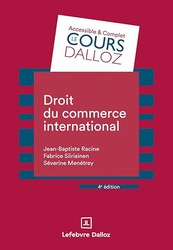
► Référence complète : J.B. Racine, F. Siiriairnen, S. Menétrey, Droit du commerce international, Dalloz, coll. "Cours Dalloz-Série Droit privé", 4ière éd., 2025, 410 p.
____
► Présentation de l'ouvrage : Ce Cours expose toutes les règles particulières du commerce international (vente, transport, distribution, etc.). Le droit du commerce international est devenu une discipline mise au cœur du processus de mondialisation de l'économie. Elle est donc en pleine expansion. Ce n'est pas seulement une branche du droit international privé.
Le droit du commerce international présente une autonomie certaine par son esprit, ses méthodes et son objet. Les sources de ce droit sont particulières dans la mesure où il fait la part belle aux usages du commerce international, plus généralement désignés sous l'appellation de lex mercatoria. Les acteurs du commerce international sont variés : il s'agit bien entendu des sociétés mais aussi des États . Le particularisme du droit du commerce international se situe aussi au stade des opérations du commerce international : la vente, le transport, la distribution, etc. obéissent à des règles particulières, le plus souvent des règles matérielles de source internationale. Enfin, l'importance et l'originalité du droit du commerce international se manifestent dans le recours à l'arbitrage. En tant que justice privée, l'arbitrage est aujourd'hui devenu le mode de résolution de droit commun des litiges du commerce international.
L'ouvrage s'adresse aux étudiants qui découvrent la matière ainsi qu'aux universitaires et praticiens. Il allie connaissances théoriques et orientations pratiques. Il ouvre sur une vision différente du droit, c'est-à-dire un droit partiellement dissocié de l'État. Il met aussi l'accent sur la nécessité de bâtir un droit répondant aux défis de la mondialisation.
____
📚Consulter l'ensemble de la collection dans laquelle l'ouvrage est publié
____
📚Sont directement corrélés à cet ouvrage :
🕴️B. Haftel, 📕Droit international privé
🕴️D. Mainguy, 📕Contrats spéciaux
________
July 23, 2024
Thesaurus : Doctrine
► Référence complète : A. Supiot, "L'esprit des lois à l'époque globale", RIDE, 2023, n° 3-4, pp. 5-22
____
► Résumé de l'article (fait par l'auteur) : "La nécessaire critique de la globalisation ne doit pas conduire à céder aux passions identitaires, mais bien au contraire à œuvrer à un nouvel ordre international fondé sur l’apprentissage mutuel et la solidarité des peuples, pour relever ensemble les défis écologiques, sociaux et technologiques des temps présents. Cette voie serait celle d’une véritable mondialisation, qui reconnaîtrait la souveraineté de la limite ainsi que la dette de vie entre générations, et romprait avec l’universalisme en surplomb, sûr d’incarner la raison, pour cultiver un universalisme en creuset, attentif à la diversité des langues, des histoires et des cultures.".
____
🦉Cet article est accessible en texte intégral pour les personnes inscrites aux enseignements de la Professeure Marie-Anne Frison-Roche
________

May 4, 2023
Publications

🌐 follow Marie-Anne Frison-Roche on LinkedIn
🌐 subscribe to the Newsletter MAFR Regulation, Compliance, Law
____
► Full reference: M.-A. Frison-Roche, Use of private companies by Compliance Law to serve Human Rights, Working Paper, May 2023.
____
This Working Paper is the basis of:
🎤a conference done in French in Toulouse on June 16, 2023
____
►Summary of this Working Paper: Following the legal tradition, Law creates a link between power with a legitimate source, the State, public power being its prerogative, while private companies exercise their power only in the shadow of this public power exercised ex ante. The triviality of Economic Law, of which Competition Law is at the heart, consisting of the activity of companies that use their power on markets, relegates the action of the State to the rank of an exception, admissible if the State, which claims to exercise this contrary power, justifies it. The distribution of roles is thus reversed, in that the places are exchanged, but the model of opposition is shared. This model of opposition exhausts the forces of the organisations, which are relegated to being the exception. However, if we want to achieve great ambitions, for example to give concrete reality to human rights beyond the legal system within which the public authorities exercise their normative powers, we must rely on a new branch of Law, remarkable for its pragmatism and the scope of the ambitions, including humanist ambitions, that it embodies: Compliance Law.
Compliance Law is thus the branch of Law which makes the concern for others, concretised by human rights, borne by the entities in a position to satisfy it, that is to say the systemic entities, of which the large companies are the direct subjects of law (I). The result is a new division between Public Authorities, legitimate to formulate the Monumental Goal of protecting human beings, and private organisations, which adjust to this according to the type of human rights and the means put in place to preserve them. Corporations are sought after because they are powerful, in that they are in a position to make human rights a reality, in their indifference to territory, in the centralisation of Information, technologies and economic, human, and financial means. This alliance is essential to ensure that the system does not lead to a transfer of political choices from Public Authorities to private companies; this alliance leads to systemic efficiency. The result is a new definition of sovereignty as we see it taking shape in the digital space, which is not a particular sector since it is the world that has been digitalised, the climate issue justifying the same new distribution of roles (II).
________
🔓read the full developments below⤵️
Nov. 27, 2020
Thesaurus : Doctrine
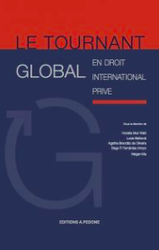
Full reference: Lagarde, P., Preface of Le tournant global en droit international privé, Muir-Watt, H., Biziková, L., Brandão de Oliveira, A., Fernández Arroyo, D. P., Ma, M. (ed.), Editions Pedone, 2020, pp. 9-14
June 17, 2020
Thesaurus : Doctrine
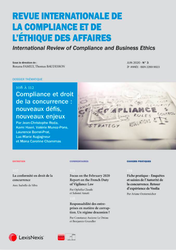
Full reference: Salah, M. M., The Legal Framework for New Silk Roads: a Globalized Law at the Service of a Global ambition. When China Discovers the Virtues of Globalization of Law, International Business Law Journal, n°3, 2020, p. 319-351
This article is available for Sciences Po's students via the Drive in the folder MAFR Regulation et Compliance
March 21, 2019
Thesaurus : Doctrine
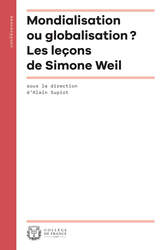
Full reference : Supiot, A., (dir.), Mondialisation ou globalisation ? Les leçons de Simone Weil, coll. "conférences", ed. Collège de France, 233 p.
March 21, 2019
Thesaurus : Doctrine

► Référence complète : A. Supiot, "Introduction", in A. Supiot (dir.), Mondialisation ou globalisation ? Les leçons de Simone Weil, Paris, Éditions du Collège de France, coll. "Conférences", 2019, pp. 9-14
____
► Résumé de l'article :
____
🦉Cet article est accessible en texte intégral pour les personnes inscrites aux enseignements de la Professeure Marie-Anne Frison-Roche
________
March 21, 2019
Thesaurus : Doctrine

► Référence complète : A. Supiot, "Conclusion. La souveraineté de la limite", in A. Supiot (dir.), Mondialisation ou globalisation ? Les leçons de Simone Weil, Paris, Éditions du Collège de France, coll. "Conférences", 2019, pp. 221-233
____
► Résumé de l'article :
____
🦉Cet article est accessible en texte intégral pour les personnes inscrites aux enseignements de la Professeure Marie-Anne Frison-Roche
________
May 31, 2018
Conferences

Référence générale : Frison-Roche, M.-A., La garde de l'unité de la personne dans un système a-moral, in Cour de cassation & Association française de philosophie du Droit, Droit & Ethique 31 mai 2018, Paris.
Lire le programme disponible sur le site de la Cour de cassation.
Lire une présentation générale du colloque.
Lire une présentation des observations finales par ailleurs présentée..
Résumé de la contribution : Le Droit a pour fonction de protéger l'être humain. Si l'on confronte la situation concrète des être humains et la puissance du Droit (I), le Droit peut donner une unité à l'être humain, unité qu'il n'a pas ni par nature ni par la société, par l'invention juridique de la personnalité (I.A). Mais le Droit est aujourd'hui lui-même tenté de pulvériser l'unité de la personne, notamment à travers le "Droit des données" et le "Droit des prestations corporelles", ce dont la GPA est le bastion avancé (I.B). L'on songe alors à requérir la souveraineté éthique du Droit (II) Pourquoi ? Parce qu'il y a urgence à maintenir l'unité de la personne humaine grâce au Droit, en raison de l'a-moralité d'un monde sans limite, gouverné par la rencontre livre des désirs (II.A) en retenant l'hypothèse d'un droit "de principe" (II.B), d'un Droit qui peut exprimer les principes éthiques garantissant à l'être humain d'être pas la matière première de marchés de l'humain qui se construisent sous nos yeux (II.C).
Faute de temps, cette contribution n'a pas pu être présentée.
Lire le document de travail sur la base duquel la conférence a été élaborée.
Ce travail sera utilisé pour l'élaboration d'un article à paraître aux Archives de Philosophie du Droit
Jan. 17, 2018
Editorial responsibilities : Direction of the collection "Cours-Série Droit privé", Editions Dalloz (33)
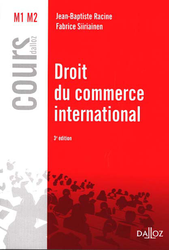
Référence complète : Racine, J.-B., et Siiriainen, F., Droit du commerce international, 1ière éd. 2007 - 3ième éd., 2018, Coll. "Cours Dalloz-Série Droit privé", Dalloz, 496 p.
Le droit du commerce international est devenu une discipline fondamentale à l'heure de la mondialisation de l'économie. Il s'agit d'un droit particulier : un droit par nature composite, fait de règles nationales et internationales, publiques et privées, qui mélange les règles de conflit et les règles matérielles et qui connaît le phénomène particulier de la lex mercatoria.
Outre les source du droit du commerce international, alimentées notamment par l'Organisation mondiale du commerce (OMC), l'ouvrage se propose d'étudier les opérateurs du commerce international, à savoir les sociétés et les États, les opérations du commerce international : vente, transport, distribution, sous-traitance, transfert de droits de propriété intellectuelle etc., et enfin de contentieux du commerce international à travers sa figure emblématique : l'arbitrage.

Dec. 12, 2017
Publications

Pour lire la version française de ce working paper, cliquer sur le drapeau français.
This working paper serves as a support for the article to be published in the book written in French, Ingall-Montagnier, Ph., Marin, J.-Cl., Roda, J.-Ch. (dir.), Compliance : l'entreprise,le régulateur et le juges, in the Serie Regulations, co-edited by Éditions Dalloz and the Journal of Regulation and Compliance (JoRC).
This work uses by links the Compliance and Regulation Law bilingual Dictionnary.
____
Summary. We have to admit it. Because in front of so numerous and so disparate Compliance rules we pain so much to figure out, we are constraint to go in so changing directions, that we console ourselves with their weight, their cost and our misunderstanding by affirming that Compliance is "complex" and "transdisciplinary", as if complicated words could mask our disarray. But "Compliance" is not a cataclysm, a bomb sent by the Americans to annihilate Europe, the new form of a Cold War in legal dress, it is a way of seeing things that comes from afar, with its own coherence and which must first be understood.
If one understands where this new corpus comes from, which now obliges companies to prove that they effectively take on the fulfillment of certain goals that go beyond them, notably the fight against money laundering, tax evasion, but also the fight against the sale of human beings or the struggle for the preservation of nature and Earth, then we can continue the story.
Indeed, not all companies are targeted by such internalization of "monumental goals" within them." An ordinary firm is destined to develop itself in order to achieve a goal which is its own. The concern of these goals can only be for the "crucial firm. "If there is to be a change in the corporate project, then it can only depend on its" position "in a system, a financial, economic, social, global system, or because it has itself decided that it would be so. The company then bears the burden of proof that such a discourse of new responsibility corresponds to a behavior and an effective culture. The weight of the rules already exists today. And it is for the moment that now, in a negative and passive way, Compliance is perceived, by those who "undergo" it (companies), even by those who apply it (public authorities).
The transformation towards a "culture of trust" is the issue between today and tomorrow, because tomorrow, it is a relationship of trust that could be built between these companies and the public authorities, because they would share information (systemic issue), because they would agree on the less technical monumental goals (protection of human beings issue).
In this perspective, "Compliance" is above all a bet, that of the place of human beings in globalized markets.
Dec. 7, 2017
Interviews
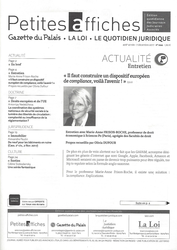
Référence complète : FRISON-ROCHE, M.-A., Il faut construire un dispositif européen de compliance, voilà l'avenir !, in Actualité/Entretien, Petites Affiches, propos recueillis par Olivia DUFOUR, n° 244, 7 déc. 2017, pp. 4-6.
Entretien donné à propos de la sortie de l'ouvrage Régulation, Supervision, Compliance.
Réponse aux questions suivantes :
- Quels sont les buts que vous assignez à la Compliance ?
- Que signifient ces deux concepts que vous introduisez : service public mondial et buts monumentaux ?
- Que devient l’État face à une entreprise globale ?
- Que pensez-vous du lanceur d'alerte ?
- Comment est affectée la relation entre l'Europe et les États-Unis ?
- Par la Compliance, les entreprises ne vont-elles pas gouverner le monde ?
______

Updated: Oct. 25, 2017 (Initial publication: May 27, 2016)
Publications

► Full Reference: Frison-Roche, M.-A., Globalization from the point of view of Law, working paper, May 2017.
____
🎤 This working paper initially served as a basis for a synthesis report made in French in the colloquium organized by the Association Henri Capitant in the International German Days on the subject of "Le Droit et la Mondialisation" (Law and Globalization).
📝 Il sert dans un second temps de base à l'article paru dans l'ouvrage La Mondialisation.
📝 it serves as a second basis for the article (written in English, with a Spanish Summary) to be published in the Brezilian journal Rarb - Revista de Arbitragem e Mediação (Revue d`Arbitrage et Médiation).
It uses the Bilingual Dictionary of the Law of Regulation and Compliance.
____
► Summary of the Working: Globalization is a confusing phenomenon for the jurist. The first thing to do is to take its measure. Once it has been taken, it is essential that we allow ourselves to think of something about it, even if we have to think about it. For example, on whether the phenomenon is new or not, which allows a second assessment of what is taking place. If, in so far as the law can and must "pretend" to defend every being, a universal claim destined to face the global field of forces, the following question - but secondary - is formulated: quid facere? Nothing ? Next to nothing ? Or regulate? Or can we still claim that the Law fulfills its primary duty, which is to protect the weak, including the forces of globalization?
____
read the Working Paper below⤵️
June 2, 2017
Conferences
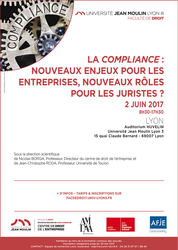
Reférence complète : Frison-Roche, M.-A., Les fonctions de la Compliance. Un choix politique à faire ("The functions of Compliance. A political choice to do"), in Borga, N. et Roda, J.-Ch. (dir.), La compliance : nouveaux enjeux pour les entreprises, nouveaux rôles pour les juristes ? ("Compliance: new challenges for companies, new roles for lawyers?"), Centre du Droit de l'entreprise Louis Josserand, Université Lyon IIII Jean Moulin, France, Lyon, 2 juin 2017.
Summary of the conference :
Compliance mechanisms are being constituted in "Compliance Law", new branch of Economic Law. Its functions are determined by the goals. But the goals are "monumental", since it is nothing less than the end of corruption, trading in influence, arms trafficking, international terrorism, trafficking in human beings, selling of human organs, the effective safeguard of environmental protection, safeguarding the planet, access to culture for all, preservation of civilization, the effectiveness of human rights ...
The goals of a company are not a priori of this order, even if every firm understands that it is clever to appear amiable.
By comparing the two types of goals, a difference of nature is measured.
By the Compliance Law, companies are therefore invited to "get out of themselves.
Consequently, the functions that shape the contours of Compliance Law transform those who are the "subjects of law", the enterprises: these are the subjects, insofar as they are agents of legality. But this can not be the case for all companies.
If the effect of Compliance were to be generalized to all companies, this would be catastrophic and would make no sense.
However, who firmly and precisely drew the circle of "legal subjects eligible to be the legality agent" of Compliance? With the considerable costs and responsibilities that go with it?
If it has not been the Legislator, it will have to be the Judge. Because the judge is guardian of the spirit of Law and guardian of legal orders. Especially if it is a global legal order.
___
Moreover, companies are not only passive subjects of Compliance Law - which would be the case of a misunderstood Compliance Law - but are also active subjects of Compliance Law. Indeed, these "monumental goals" which draw the functions of the Compliance are exactly the same as those of the Corporate Social Responsibility.
Thus, if the Compliance is conceived of only as an immense and empty submission of all undertakings to total regulation, the result will be an opposition between the regulatory power and the will of undertakings, a concrete opposition between public authorities and companies. If, on the other hand, we conceive Compliance Law as that by which "crucial enterprises" like the Regulators are moving towards the realization of "monumental goals, then Compliance Law crystallizes a" Trust Pact""between the two, Which goes beyond the borders and becomes a means of regulating globalization.
This second conception is the future of European Law.
____
See the slides (in French).
Read the working paper on which the conference is based (working paper in English)
Dec. 14, 2016
Conferences

Dans la 18ième édition du livre d'économie, il s'agit d'appuyer sur l'ouvrage de Jean Tirole, présent pendant la conférence, L'économie du bien commun, pour prendre un thème d'économie avec un public de lycéens.
Lire le programme du colloque.
La question est celle de la croissance et du marché telle que l'État peut l'envisager, soit comme acteur, soit comme régulateur.
Dans la 1ière table-ronde animée par Pierre-Henri de Menthon, intervient Varie Rabault, rapporteure générale de la Commission des finances à l'Assemblée Nationales qui expose le rôle du budget de l'État dans le pilotage à long terme de l'économie.
Puis Philippe Sauquet, membre du Comex de Total explique que l'entreprise privée prend la mondialisation comme un fait acquis mais parvient néanmoins à développer des stratégies à très long terme, internationales avec des investissements très lourds, en s'appuyant sur la puissance des États, dont elles souhaitent l'autorité et aimeraient un comportement plus prévisible et moins court-termiste.
Jean Tirole reprend l'idée que la mondialisation est un fait. L'enjeu est que les pays ne se replient pas. Pour cela, il faut que les plus possibles y gagnent et que ceux qui y perdent
Puis Jean-Marc Daniel revient sur l'idée de l'ouverture définitive de l'économie, notamment du fait du numérique, ce qui va bouleverser les comportements et créer de nouveaux marchés. La concurrence est déjà là et l'État doit lui-même se comporter comme un producteur de normes facilitant cette compétitivité.
Marie-Anne Frison-Roche a souligné que la part du droit dans cette économie dont le principe est le marché apparaît de plus en plus nettement, un droit qui n'est pas réduit à de la réglementation mais prend la forme de contrats, d'un droit de la concurrence et de jurisprudence dont l'adoption est déterminante et varie suivant les cultures des pays. Ainsi l'Angleterre ou les États-Unis ont une culture juridique populaire plus développée qu'en France, ce qui rend le choc de l'ouverture des marchés moins violent. L'éducation juridique précoce devrait être développée en France. Et ce d'autant plus que le métier de juriste est un métier de grand avenir.
March 11, 2015
Thesaurus : Doctrine
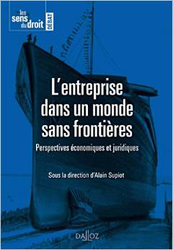
Full reference : Supiot, Alain (dir.), L'entreprise dans un monde sans frontières. Perspectives économiques et juridiques, coll. "Les sens du droit", Dalloz, 2015, 320 p.
Read the forth of cover.
Read the table of contents.
Read the introduction by Alain Supiot : L'entreprise face au Marché total.
Read Marie-Anne Frison-Roche's contribution : Les "entreprises cruciales" et leur régulation.
Jan. 15, 2015
Conferences

Le droit prétend être un système autonome, produisant sa propre réalité, incontestable. Acte de langage, il est performatif, en cela souverain. La mondialisation le permet-elle encore ? Pourtant, le droit étant aussi une pratique sociale, soit il prend son objet comme limite (il ne peut dire qu’il fait jour la nuit), soit il prend son objet comme maître : le droit nazi établit la « loi du sang ». Aujourd’hui, l’économie est-elle la loi du droit ?
En outre, le droit n’est-il pas positif qu’une fois appliqué ? Dès lors, le droit recherche l’adhésion, par un discours qui séduit et balance les intérêts. Mais dans le même temps, le droit veut de plus en plus refléter la réalité. Sa première évolution l’éloigne de la vérité pour aller vers le consensus, la seconde prétend la rapprocher. Par exemple, qui décide de la filiation ? On en vient à douter que le Politique ou la morale aient encore une place dans le système juridique.
Avoir une première vue du programme.
Lire le programme général du colloque, Sous-détermination, incomplétude, incommensurabilité : la pensée des limites
Lire le Working Paper établissant les grandes lignes servant de base à la discussion
Oct. 24, 2014
Publications
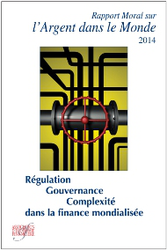
Référence complète : FRISON-ROCHE, Marie-Anne, La nature prométhéenne du droit en construction pour réguler la banque et la finance, in Rapport Moral de l'Argent dans le Monde 2014, Régulation. Gouvernance. Complexité dans la finance mondialisée, Association d'Économie financière, 2014, p.37-48.
On croit que le droit est plus que jamais puissant en régulation bancaire et financière : il envahit tout et apparait sous sa forme la plus terrible qu'est le droit pénal et le droit administratif répressif. Cela ne paraît que le début : tout est droit ! Il faut pourtant considérer que le droit est plus faible que jamais.En effet, si le droit de régulation bancaire et financière est devenu avant tout répressif, c'est parce qu'il est faible. Il n'est plus que la voie d'exécution d'une multitude de règles microscopiques, une sanction s'adossant à toute prescription. Mais la répression a perdu son autonomie, tandis qu'elle se débarrassait des droits de la défense. Plus encore, le droit s'est dégradé en réglementation. La régulation va vers un amas aléatoire de prescriptions peu compréhensibles, dans un droit qui s'essouffle à poursuivre l'imagination des opérateurs. Alors que ceux-ci auraient besoin d'un droit qui fixe par avance et clairement des lignes. C'est donc un droit faible et de mauvaise qualité vers lequel la régulation bancaire et financière va et par lequel elle est envahie. Le juriste ne peut qu'être tout aussi chagriné que le financier.
Cet article a été établi à partir d'un working paper.
March 14, 2014
Thesaurus : Doctrine

Updated: July 31, 2013 (Initial publication: Oct. 4, 2011)
Teachings : Les Grandes Questions du Droit, semestre d'automne 2011

March 20, 2013
Conferences

Dans un colloque très complet de deux journées, cette intervention particulière porte sur les autorités de régulation, telles qu’elles sont en train d’être mises en place, et telles qu’il convient de les concevoir. Mais cette perspective institutionnelle ne doit pas conduire à avoir une vision désincarnée du sujet. En effet, et en premier lieu, c’est sans doute, avant tout, la matière agricole, parce qu’elle nourrit les êtres humains, qui doit être considérée pour construire le système d’autorité de régulation, et non pas seulement le fait qu’il s’agit de matières premières, parmi d’autres matières premières, encore moins des produits financiers, sous prétexte que la financiarisation a été l’élément déclencheur du besoin de régulation. En second lieu, la question est de savoir si l’autorité doit être mondiale, nationale ou régionale. On peut espérer pouvoir construire des autorités régionales. Cela rejoint l’espoir que l’on met dans l’Europe, une Europe qui ne soit pas seulement concurrentielle et qui, dépassant les politiques étatiques, ne se réduise pourtant pas au marché.
Lire le programme du colloque.
Accéder aux slides de la conférence.
Accéder à l'article publié à la suite de la conférence;
Lire la présentation générale de l'ouvrage publié par la suite dans la collection "Droit et Economie".